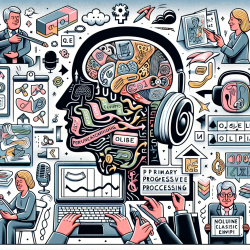Introduction
The journey of understanding child development is multifaceted, with various factors influencing outcomes. One significant yet often overlooked factor is paternal mental health. The research article titled "The effects of pre- and postnatal depression in fathers: a natural experiment comparing the effects of exposure to depression on offspring" sheds light on the profound impact paternal depression can have on child development. As practitioners, integrating these insights into our practice can enhance our ability to support children and families more effectively.
Key Findings from the Research
The study highlights that children whose fathers experience depression both prenatally and postnatally are at a higher risk of developing behavioral and emotional problems. Specifically, boys are more susceptible to conduct issues when exposed to postnatal paternal depression. These findings suggest that the environment, influenced by paternal mental health, plays a crucial role in shaping child outcomes.
Implementing Research Outcomes in Practice
Practitioners can enhance their skills and interventions by considering the following strategies:
- Early Identification and Intervention: Screen for paternal depression during prenatal and postnatal periods. Early detection can lead to timely interventions, reducing potential adverse effects on children.
- Family-Centric Approach: Encourage family involvement in therapeutic settings. Addressing paternal mental health as part of family therapy can create a supportive environment for both the parent and child.
- Educational Workshops: Conduct workshops for parents, highlighting the importance of mental health and its impact on child development. Educating fathers about the potential effects of their mental health can motivate them to seek help.
- Collaboration with Mental Health Professionals: Work closely with psychologists and psychiatrists to provide comprehensive care for families. Integrated care models can address both the mental health needs of fathers and the developmental needs of children.
Encouraging Further Research
While this study provides valuable insights, there is a need for further research to explore the mechanisms by which paternal depression affects child development. Practitioners are encouraged to engage in or support research initiatives that aim to:
- Identify specific psychosocial factors that mediate the relationship between paternal depression and child outcomes.
- Explore interventions that can mitigate the impact of paternal depression on children.
- Investigate the long-term effects of paternal mental health on child development across different cultural contexts.
Conclusion
Understanding the impact of paternal mental health on child development is crucial for practitioners aiming to provide holistic support to families. By integrating the findings of this research into practice and advocating for further studies, we can contribute to healthier developmental trajectories for children.
To read the original research paper, please follow this link: The effects of pre- and postnatal depression in fathers: a natural experiment comparing the effects of exposure to depression on offspring.










